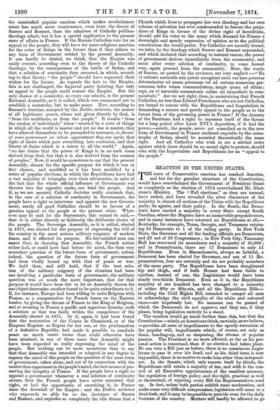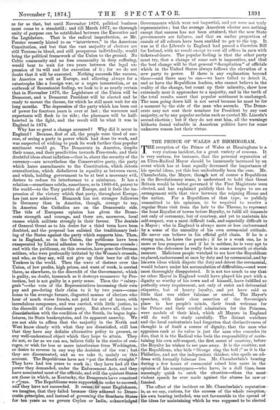-REACTION IN nu: UNITED STATES.
MIIE wave of Conservative reaction has -reached America,
and but for the peculiar structure of the Constitution, would have overwhelmed the Government of President Grant as completely as the election of 1874 overwhelmed Mr. Glad- stone's Ministry. The "Fall elections;" as -they are termed, have ended, and have revealed the utter discontent of the majority in almost all sections of the Union with the Republican party, -its agents, and their policy. In -the South, the Demo- crats have carried _a majority -in every State except South Carolina,-where the Negroes -have an immovable preponderance, and in many instances have returned .no Republicans at ell,— Kentucky, for example, Texas, Georgia, and Tennessee return- ing 34 Democrats to 1 of the ruling -party. In New York State, the Governor and all the leading officials are Democrats, and _22 opt of 33 Congressmen ; in New York City, Tammany Hall has recovered its ascendancy and a majority of 40,000; and in 'Pennsylvania, -there are 17 Democrats to only 11 Republicans. Even in Massachusetts, .always ...so faithful, a Democrat has -been elected for Governor, and out of 11 Re- presentatives, four are certainly and six are probably members of the same party. The Republicans have been slaughtered hip and thigh, and if both Houses Chad been liable to ejection, instead of one, the Legislature would have been nearly two-thirds Democrat. Even as it is, the Republican majority of one hundred has been changed to a _minority of either fifty or fifty-six, and all the Republican Rills— including the Civil Rights Bill, intended to compel all men to acknowledge the civil equality-of the white and coloured races—are hopelessly lost. No measure can be passed of which the Democrats do not approve, and they can, if they please, 'bring legislation entirely to stand.
The reaction would go much .further than this, but that the Constitution—wisely, as Americans think, unwisely, aewe believe, —provides all sorts of impediments to the speedy execution of the popular will, impediments which, of course, act only as dams, ,heading-up, and .so deepening, the -stream of popular passion. The President is no more affected, as far as his per- sonal action is concerned,-than if .no election had taken place. He can veto a Bill just as before, there is no unanimous Legis- lature to pass it over his head, and as his third term is now impossible,-there is no motive to make lim.other -than independ- ent. In the -Senate, which only renews itself by thirds, the Republicans still retain a majority. of ten, and with it the con- trol of all Executive appointments4Df the smallest moment, the regulation of foreign policy, and the right, practical as well as theoretical, of rejecting every Bill the Representatives send up. In -fact, unless both parties exhibit some moderation, and make some very difficult compromises, legislation will come to a dead-lock, andit may beimpossible to provide even for -the daily business of the country-. Matters will hardly be allowed to go as far as that, but until November 1876, political business must come to a standstill ; and till March 1877, no thorough' unity of purpose can be established between the Executive and the Legislature. That is the radical imperfection, as Mr. Forster recently hinted- to an "interviewer," in the American Constitution, and but that the vast majority of electors are still Teutons in blood, and still prosperous individually, would bring the political framework of the Union to the ground. No Celtic community and no free community in deep suffering, would bear, to wait for two years between the legal ex- pression of its will and the execution of it ; for we do not doubt that it will be' executed. Nothing succeeds like success, in America as well as Europe, and allowing always for a catastrophe like a foreign war, or a negro insurrection, or an outbreak of Secessionist feeling, we look to it as nearly certain that in November 1876, the Legislature of the Union will be Democrat., and a Democrat President will be elected and be ready to mount the throne, for which he still must wait for six long months. The -depression of the party which has been out of power for fourteen years is over at last ; the waverers and expeetants will flock to its side ; the plaoemen will be half- hearted in the fight, and the result will be what it was in England in 1874.
Why has so great a change occurred? Why did it occur in England ? Because, first of all, the people were tired of suc- cess, of seeing a party in power which had done its work, and was suspected of wishing to push its work further than popular sentiment would go. The Democrats in America, despite their name, and their proclivities towards Free-trade, and their doubtful ideas about inflation—that is, about the security of the currency—are nevertheless the Conservative party, the party which hates amendments to the Constitution, which detests centralisation, which disbelieves in equality as between races, and which, holding government to be at best a necessary evil, desires to reduce its interference to a minimum. It has a relation—sometimes subtle, sometimes, as in 1860-64, patent to the world—to the Tory parties of Europe, and it feels the im- pression of the victory which that party, throughout Europe, has just now achieved. Bismarck has not stronger followers in Germany than in America, though, strange to say, in. America the Catholics are on the Democratic side. The tide of European opinion has given the Demo- crats strength and courage, and there are, moreover, local causes which militate strongly in their favour. The denials- of General Grant as to his desire for a third term have been doubted, and the- proposal has enlisted the -traditionary feel- ing of the States against the party which supports him.- Then, as in England, so in the--Union, the publicans have been. exasperated by Liberal adhesion to the Temperance crusade ; and with the publicans, on this occasion, have gone the German settlers,- who were profoundly irritated by the Women's crusade, and who, as they say, will not give 'up their beer for all the- Yankees in the world. Then the, wave of distress 'over the. Union, of low profits, high prices, and want of work,- is carried
there, as elsewhere, to the discredit of the Government,- guilty, no doubt, inasmuch as it destroys commerce by Pro-
tection, but is not guilty in a party sense. Then-the " salary- grab "—the vote of the Representatives increasing their own pay and pre-dating their claim to it by two years—came. home to the average farmer, disgusted masses of electors who hear of much worse frauds, not paid for out of taxes, with incredulous composure, and was carried, with little -justice, to the discredit of the dominant party. But above all, there is dissatisfaction with the condition of the South, its bogus legis- latures, its State bankruptcies, and its apparent anarchy. We are not able to affirm that the majority in the North and- West know clearly with what they are dissatisfied, still less that they have any definite alternative policy to present, or any well-understood object which they hope to attain. They do not, so far as we can see, believe fully in the stories of out- rages, or wish for less or more interference from Washington; or desire to reverse in any way the decision of the war ; b they are discontented, and as we take it, mainly on this account. The Republicans have-not "put the South straights? They have had ten years to work in-; they have had all the power they demanded, under the Enforcement Acts, and they have nominated most- of the officials, and still the quietest States- are
those in which, as Kentucky, the Democrats have remained
s. The Republicans were supportekin order to succeeds- and have not succeeded. It Seemstii' most Englishmen we imagine, that they failed because they adhered to Demo- cratic-principles, and instead-of governing the Southern States- for ten years as we govern. Ceylon or India. acknowledged Governments which were not impartial, and yet were not truly representative ; but the average American elector sees nothing except that success has not been attained, that the new State governments are failures, and that an undue proportion of rascals of all colours have been enabled to get to the top. It was as if the Liberals in England had passed a Coercion Bill for Ireland, with no result except to vest all offices in-men with tickets-of-leave. The popular feeling is that the other party must try, that a change of some sort is imperative, and that the best change will be that general "decapitation" of officials which in the United States always follows the elevation of a new party to power. If there is any explanation beyond these—and there may be one—we have failed to detect it, and so have the Republican leaders, who cannot believe in the reality of the change, but count up their minority, show how extremely near it approaches to a majority, and in the teeth of the total results assert that popular sentiment is unchanged. The man going down hill is not saved because he must be for a moment by the side of the man who ascends. The Demo- crats may not seat their nominee for President by any vast majority, or by any popular acclaim such as carried Mr. Lincoln's second election ; but if they do not seat him, all the warnings hitherto found valuable in American politics have for some unknown reason lost their virtue.



































 Previous page
Previous page